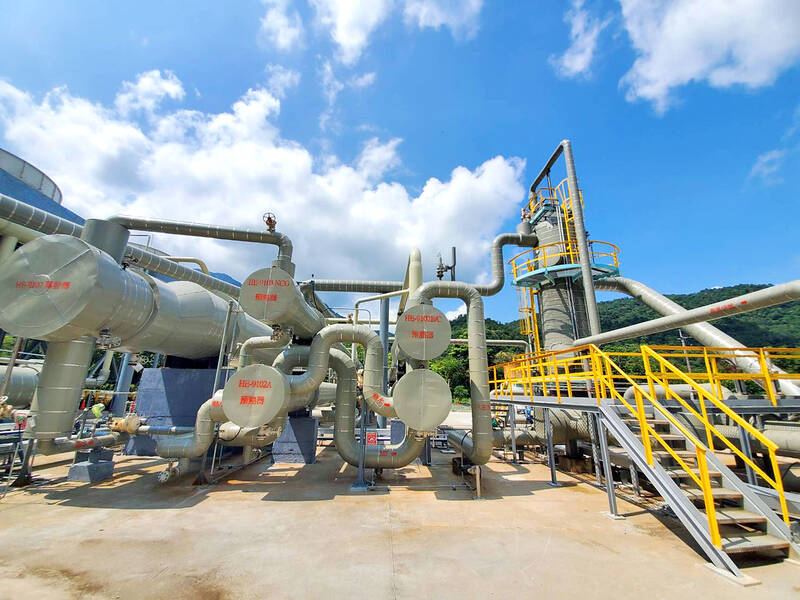The operators of Taiwan’s first privately run megawatt-level geothermal power plant in Yilan County have revealed that the site has produced more than 38 million kilowatt-hours (kWh) of electricity since opening in October 2021.
Staff at the 4.2MW Cingshuei Geothermal Power Plant shared the information during a visit by Minister Without Portfolio Wu Tze-cheng (吳澤成) and Yilan County Commissioner Lin Zi-miao (林姿妙) on Friday.
The development of the geothermal power plant in Datong Township (大同) was contracted to Yi Yuan Co (宜元股份), a joint venture of Fabulous Power Co (結元能源開發) and Taiwan Cogeneration Corp (台灣汽電共生), on a build-and-operate, and rehabilitate-operate-transfer model, when Wu was acting Yilan County commissioner in 2017.

Photo courtesy of Yilan County Government via CNA
The power plant then began operations October 2021 during Lin’s term and has produced 38 million kWh of power as of the end of July, its operators said.
The construction began in 2017 with an initial investment of NT$765 million (US$23,90 million), and the power plant was completed in September 2021 before securing a license from the Bureau of Energy a month later.
The plant has adopted “binary-cycle generators” that cause less damage to turbines and less precipitation of solids. the Yilan County government said.
The 38.25 million kWh generated can meet the demand of about three-quarters of the combined households in Datong Township and the neighboring Sanshing Township (三星), the county government said.
The two townships consist of about 10,000 small households.
When Wu, who concurrently serves as head of the Executive Yuan’s Public Construction Commission, inquired whether the accumulation of solid substances — commonly known as “fouling” — could possibly again affect the plant’s operations, he was assured by Yi Yuan Co that the new generator units have been efficient and so far the fouling rate has been better than before.
Touting the power plant as a crucial energy provider for Yilan County and a milestone for Taiwan’s effort to achieve sustainable development, Lin said she is expecting to continue local-central collaboration on power generation in the future.

South Korea’s equity benchmark yesterday crossed a new milestone just a month after surpassing the once-unthinkable 5,000 mark as surging global memory demand powers the country’s biggest chipmakers. The KOSPI advanced as much as 2.6 percent to a record 6,123, with Samsung Electronics Co and SK Hynix Inc each gaining more than 2 percent. With the benchmark now up 45 percent this year, South Korea’s stock market capitalization has also moved past France’s, following last month’s overtaking of Germany’s. Long overlooked by foreign funds, despite being undervalued, South Korean stocks have now emerged as clear winners in the global market. The so-called “artificial intelligence

NEW IDENTITY: Known for its software, India has expanded into hardware, with its semiconductor industry growing from US$38bn in 2023 to US$45bn to US$50bn India on Saturday inaugurated its first semiconductor assembly and test facility, a milestone in the government’s push to reduce dependence on foreign chipmakers and stake a claim in a sector dominated by China. Indian Prime Minister Narendra Modi opened US firm Micron Technology Inc’s semiconductor assembly, test and packaging unit in his home state of Gujarat, hailing the “dawn of a new era” for India’s technology ambitions. “When young Indians look back in the future, they will see this decade as the turning point in our tech future,” Modi told the event, which was broadcast on his YouTube channel. The plant would convert

‘SEISMIC SHIFT’: The researcher forecast there would be about 1.1 billion mobile shipments this year, down from 1.26 billion the prior year and erasing years of gains The global smartphone market is expected to contract 12.9 percent this year due to the unprecedented memorychip shortage, marking “a crisis like no other,” researcher International Data Corp (IDC) said. The new forecast, a dramatic revision down from earlier estimates, gives the latest accounting of the ongoing memory crunch that is affecting every corner of the electronics industry. The demand for advanced memory to power artificial intelligence (AI) tasks has drained global supply until well into next year and jeopardizes the business model of many smartphone makers. IDC forecast about 1.1 billion mobile shipments this year, down from 1.26 billion the prior

People stand in a Pokemon store in Tokyo on Thursday. One of the world highest-grossing franchises is celebrated its 30th anniversary yesterday.